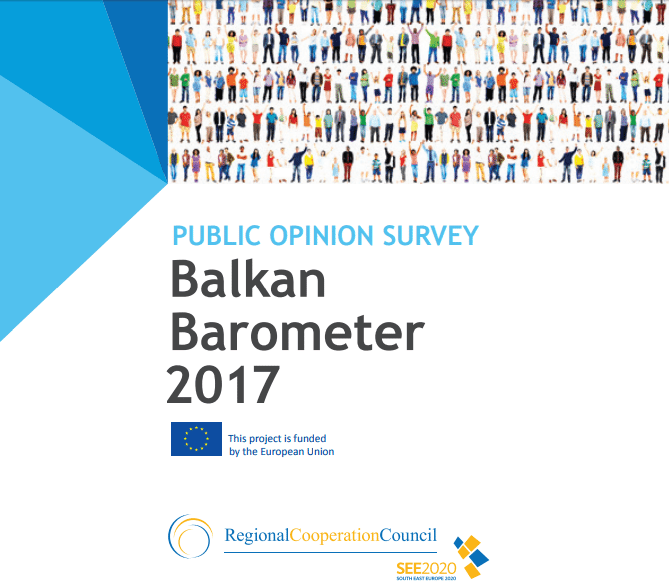TIRANA, October 10
Albania has neither the best nor the worst performance among the Balkan countries regarding the Public Sentiment Index (BPSI). Yet it is the only country that made no improvement. This was stated in the Balkan Barometer 2017 by the Regional Cooperation Council (RCC). The Balkan Barometer is an annual public opinion survey commissioned by RCC to collect and analyze data on a wide range of issues dealing with the political, socio-economic, business and investment climate, infrastructure, rule of law and other developments in seven SEE countries.
“BPSI represents a measure of the current state of affairs and expectations for the future regarding the general and economic situation, as well as the situation concerning individual households taking part in the survey. It is a measure that helps to monitor changes in time at the SEE regional level as well as the level of individual economies through five questions,” the report says.
Regarding Albania, the report says that looking at trends from 2014 to 2016, expectations have improved year after year throughout the region (except in Albania).
Life Satisfaction and Assessment of General Trends
Satisfaction of respondents with the current situation in their own economy is below average, with the satisfaction rate (on a scale of 1 to 5) for the entire region measured at 2.3.
People from Kosovo and Montenegro are significantly more satisfied than people in any other economy while the least satisfied are the people of Albania and Bosnia and Herzegovina.
Attitudes on Regional Cooperation and EU Integration
Over 81 percent of the population in Albania see EU membership as something good. People see the benefits of the EU accession in the form of study and work and economic prosperity. Albania and Kosovo come out particularly strongly as pro-EU compared to Serbia, Macedonia, and Bosnia and Herzegovina, where respondents believe that the EU accession is not a realistic prospect.
Respondents in Albania are significantly more likely to believe that political disputes, security issues/terrorism, border issues as well as minorities, represent more important problems for the region than unemployment, the overall economic situation, and crime.
Unemployment and Risk of Poverty
Regarding social self-positioning, 35 percent of the respondents in Albania say that they live below the average, the highest in the region.
Looking at the numbers across the economies, there are significantly more self-employed people in Albania (11%), along with moonlighting workers (8%).
“Albania is an unfortunate regional leader in this category with 17% of respondents in this economy losing their jobs over the past 3 years,” the report highlights.
“In Albania, as many as 39% of households were unable to pay utility bills at least once and 43% were unable to keep their home adequately warm. Albanian households, however, have recorded an increase in assistance received. Households in Albania and Kosovo have tended to receive more assistance while respondents from Serbia and Croatia record the fewest such instances,” the report says.
Albanians along with Kosovans and Macedonians are significantly more likely to feel left out society and looked down upon because of their financial situation. Moreover, some 46 percent of respondents in Albania fear to fall into poverty.
Employability and the Labor Market
Based on the report data, people in Albania still believe that hard work is the most important predictor of success. Moreover, respondents in Albania and Kosovo consider professional experience and education as especially important making them the only two economies where education is considered the most important factor in getting a job. On the other hand, 46 percent of Albanians consider knowing people in high places critical for getting a job.
Albania and Kosovo are the countries with the highest percentage of people complaining about the lack of jobs on offer. Another finding shows that people in Albania prefer working in the private sector more compared to the other countries. Meanwhile, the Albanians that choose the public sector do it out of a sense of public duty, the potential for professional development, for better advancement opportunities, and because of better work conditions.
Attitudes Towards Mobility
Kosovans tend to move toward Croatia and Albania. The country also ranks last regarding the number of people that traveled most during the last 12 months. Kosovo and Albania had most regional leisure travelers. The two countries also rank first in the region for the support that they provide to people coming and living in their economies.
Attitudes to Social Inclusion of Vulnerable Groups
People in Albania are among the most supportive on the region regarding the affirmative government action in favor of people with disabilities, displaced people and refugees, Roma population, and other ethnic minorities.
Attitudes Towards Mobility
About 50 percent of respondents consider leaving and working abroad.
Perceptions on Trade
Respondents in Albania were least likely to consider domestic products competitive in the
SEE region. However, the report says that domestic products are prevalently the first choice across all economies with the exception of Albania where the preference lies with products from Western Europe. Domestic products make their second choice. Albanians are more likely to pay attention to the origin of products.
Albanians are among the people that see the presence of foreign companies entering the market as advantageous.
Attitudes Towards Climate Change and Energy
People in Albania are likely to hold the government primarily responsible for climate change mitigation, along with business and industry.
Regarding the perception of public institutions and services, respondents from Albania are most inclined to distrust their courts. The people from Albania are significantly more likely to agree with the statements relating to the critical attitude of the supreme audit institution and the media towards the government. Albanians also say that the media is performing its role as a critic of the government more than any other actor.
Regarding the perception of corruption, individuals from Albania are more likely to perceive political parties as corrupt, customs, and medical and health services.
News Source/ Photo Credit: RCC

Leave a Reply
You must be logged in to post a comment.